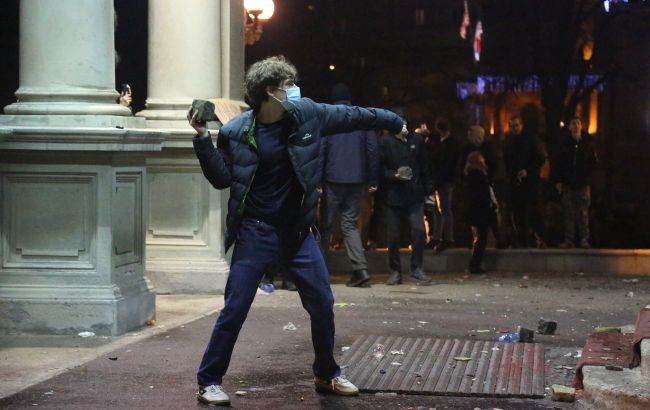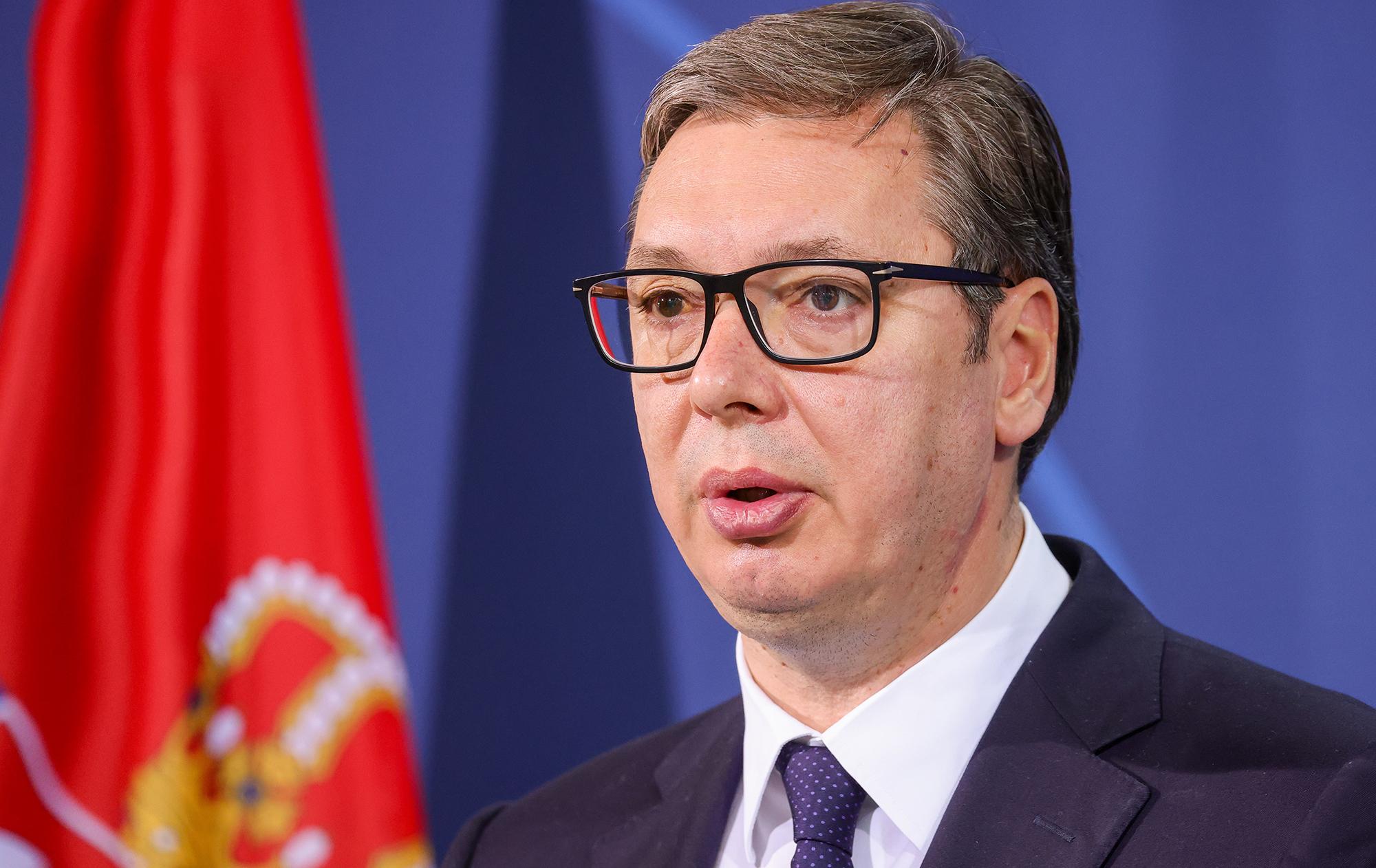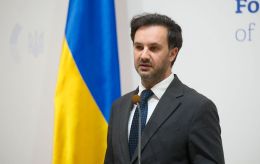'Glass of anger has been spilled': Unveiling cause of Belgrade protests and demands of Serbian opposition
 Protester outside the Belgrade City Hall building on December 24, 2023 (Photo: Getty Images)
Protester outside the Belgrade City Hall building on December 24, 2023 (Photo: Getty Images)
Anti-government protests in Belgrade, Serbia, led to unrest with attempts to storm the city hall and a police crackdown. President Aleksandar Vucic accused the participants of intending to destabilize the country, echoing Russian claims of a supposed "Maidan technique."
For more on the reasons behind the protests and the objectives of the Serbian opposition, read the material by RBC-Ukraine.
Sources used in compiling this article include materials from Serbian outlets such as RTS, blic.rs, informer.rs, statements from opposition representatives, President Aleksandar Vucic, the Belgrade authorities, and the Russian Ministry of Foreign Affairs.
Opposition against. What sparked the protests?
After President Aleksandar Vucic dissolved the parliament (Narodna Skupstina) on November 1, early elections were held on December 17. The pro-presidential coalition Serbia Does Not Stop won with 46.3% of the vote, which includes the ruling Serbian Progressive Party (SNS).
Following closely at 23.6% of the votes was the opposition coalition Serbia Against Violence (SPN), formed after two mass shootings in schools in May 2023. In third place was the party Ivica Dacic - Prime Minister of Serbia with 6.6%.
Protests erupted immediately after the announcement of the results. Pro-European opposition disputes the election outcome, citing international observers' data. According to the monitoring mission's findings, the Serbian Progressive Party gained an unfair advantage due to media bias, Vucic's influence, and violations such as vote-buying.
The most significant violations occurred in parallel elections for the Belgrade City Council. According to SPN, to secure victory, authorities brought in individuals who had never resided in the capital. Approximately 40,000 temporary identity documents were issued, allowing people imported from Bosnia and Herzegovina and other former Yugoslav republics to vote.

Photo: Deputy Marinka Tepic and a group of opposition members announced a hunger strike in disagreement with the election results (facebook.com/MiikiAleksic)
Opposition displeasure with the Belgrade election results brought supporters to the streets on December 18. Protesters gathered outside the city assembly building, and then moved to the Republican Electoral Commission (REC). They chanted "Betrayal," "We won't accept the election," demanding the annulment of the voting results. They attempted to storm the REC building but were limited to throwing eggs and tomatoes.
The next day, demonstrators blocked traffic on Belgrade's central street, continuing the protest near the election commission. The protests continue, with the most massive and radical action taking place on December 24.
One of the opposition leaders, Marinka Tepic, announced a hunger strike until the election results were annulled. She was joined by deputies Elena Milosevic, Daniela Grujic, Janko Veselinovic, and the head of one of the unions, Zeljko Veselinovic.
Escalation in Belgrade. Storming the City Assembly and police action
On Sunday evening, thousands once again reached the Republican Electoral Commission building. The opposition declared that they would not back down from their demand to annul all election levels and update the voter lists.
"None of us came here on a personal whim. The institutions have abandoned us, and the state has sold us," stated another SPN leader, Miroslav Aleksic.
The student wing appealed to Aleksandar Vucic, asking him to meet all demands by Monday evening, threatening to block all of Belgrade. Dimitrije Dimic, the leader of dissatisfied students, called on citizens to join and support the protest, bring food and warm clothing.
Serbia’s increasingly authoritarian president @AVucic has just said there are “only 2’490 people protesting” against his fraudulent elections.
— Jakub Bielamowicz (@KubaBielamowicz) December 24, 2023
2’490 people in Belgrade now: pic.twitter.com/TJ6wT6o0Xm
Simultaneously with the protest, there was a meeting of the electoral commission. The demand to appoint new elections for the Belgrade City Assembly was discussed. By majority vote, the commission members sent letters to the Ministry of Internal Affairs and local self-government asking to verify the claims of Serbia Against Violence.
Additionally, it was decided to hold repeat elections in three polling stations in Belgrade. The voting will take place on Saturday, December 30, from 07:00 to 20:00. However, concerning allegations of falsification in Belgrade, after the verification by the Election Commission, it was stated that the majority of voters had Belgrade residency and were registered in the Unified Voter List long before the elections.
Another leader of SPN, Srdjan Milivojevic, stated that it was over for those who stole the elections.
"A glass of anger and fury has been spilled," he said.
Opposition leaders urged protesters to act and liberate the city assembly building. Aleksić stated that the international community needed to be sharper and more specific, not defending Vucic's regime. According to him, the ruling SNS party is the past of Belgrade, and they have no right to speak about the future. He then called on people to encircle the assembly, enter the building, and "appear from the balcony as winners."
Around 7:00 PM local time, a group of opposition members attempted to enter the building, but security locked the doors. It was reported that the police held the doors and threw tear gas into the crowd.
Milivojevic and Vladimir Obradovic (a candidate for Belgrade mayor) from the SPN coalition tried to open the doors amid chants of "Vucic is a thief" and "Don't give up." Then, a few individuals began breaking the glass of doors and windows. The police barricaded the entrance from the inside.
BREAKING:
— Visegrád 24 (@visegrad24) December 24, 2023
Protesters are trying to storm City Hall in Belgrade pic.twitter.com/v5VqmTV3mV
At the demand to let deputies and advisors pass, protesters stepped back from the entrance. After several attempts to break into the city assembly, the situation calmed down for a while.
The Ministry of Internal Affairs demanded to refrain from storming the building. Milivojevic issued an ultimatum: within an hour, a government representative should come out to the protesters and explain how the authorities intend to reconcile with the defeat and recognize the election falsification. In response, law enforcement started using force to disperse and make mass arrests.
Within a few minutes, the police took control of the area between the National Assembly and the Belgrade City Council. The Serbian prosecutor warned protesters that the security forces wouldn't tolerate disturbances in the streets.
Vucic on the unrest: there is no revolution, there is an external factor
Reacting to the situation near the Belgrade City Assembly, President Aleksandar Vucic addressed the nation twice. In the first, he noted that the state was strong enough to protect democracy, and "rebels and thugs" would be arrested.
"We love our country, we love our city, we are not used to having our windows smashed, our homes destroyed. Don't worry because there is no revolution happening. Nothing will happen for them (SPN representatives) to succeed," Vucic stated.
According to him, only about 2,500 people gathered at the largest rally, and at the time of the attempt to break into the Belgrade City Hall square, there were slightly over a thousand. He referred to the opposition as bandits and accused them of "wanting to destroy the city and the country."
 Photo: Aleksandar Vucic stated that there would be no revolution in Serbia (Getty Images)
Photo: Aleksandar Vucic stated that there would be no revolution in Serbia (Getty Images)
Additionally, Vucic mentioned that many in the region were pleased with the events in Belgrade.
"This is the product of much more serious geopolitical circumstances where they are attempting to undermine the independence, autonomy, and sovereignty of the Republic of Serbia," he noted, adding that some foreign intelligence agencies had previously warned about the unrest.
In a subsequent address after the National Security Council meeting, Vucic announced the arrest of 35 protesters. He stated that two police officers sustained serious injuries, and there was evidence of planned disturbances.
"I wasn't afraid of the protests. As soon as I heard what was happening, I immediately showed that I was with my people. We have remedies for bandits. As soon as the gendarmerie appeared, they scattered like rabbits within a minute and a half... We will legally pursue all these quasi-politicians. They will all be held accountable for their aggressive behavior," the president added.
In response, Serbia Against Violence stated that Vucic's regime revealed its true nature by sending special forces to suppress the protests. One of the demonstrators had their leg broken after being thrown to the ground and beaten, while Radomir Lazovic, co-chair of the Left-Green Front, was attacked by the police after the rally.
Meetings of intelligence services and student actions. What's happening today
According to updated information, 38 people have been detained for their involvement in the unrest. Eight policemen were injured, two of them seriously.
Today, at 3:00 PM, a meeting of the Security Service Coordination Bureau regarding the protests began. Its outcomes are currently unknown.

Photo: Student protest on December 25 (rts.rs)
On the other hand, students, who previously protested outside the headquarters of the Republic Electoral Commission, gathered at 11:00 for a new rally outside the Ministry of Administration and Local Self-Government. A group of students from Novi Sad University joined the protesters. They came in solidarity and believed that manipulations in Belgrade had the greatest impact on the election results.
Since the established deadline for checking the voter list has passed, they blocked the entrance to the ministry building. Two hours later, a blockade of the intersection of Birčaninova and Kneza Miloša streets in the central part of the capital began, from where columns headed towards the government building.
The protesters will submit a new request for the voter list verification. It is expected that the students will split into two columns and continue the blockade in Belgrade until 6:00 PM local time. Ivica Ivković, the chief of the local police department, warned that law enforcement would not tolerate blockades of bridges and government institutions.
"Did Russia prevent a Maidan?" What is being said in Belgrade and Moscow
As stated by the Prime Minister of Serbia, Ana Brnabić, Russian intelligence services warned Belgrade about the preparations for the protests.
"Probably, the West won't like it, but I especially feel that it is important to thank the Russian security services who had this information and shared it with us. The Serbian government shared this information with other representatives of the international community, who dismissed it as Russian disinformation. All others said it was fake," she said.
According to her, certain Western services allegedly directed what happened in Belgrade. She also emphasized that no revolution was expected in the country.

Photo: Prime Minister of Serbia Ana Brnabic picked up the Russian thesis of "Maidan techniques" (srbija.gov.rs)
"Vucic is a stability factor. There will be no Maidan in Serbia. And the will of the voters will not change on the streets. It is impossible for a self-proclaimed elite to have votes that would cost more than the votes of the people," added Brnabic.
This undertone of Russian propaganda didn't end there. As acting Mayor of Belgrade, Aleksandar Šapić stated, anarchists could destroy a state that would not be able to protect the people for whom the opposition is fighting tomorrow.
"I said that if we allow ourselves to fight for political goals using violence and overthrowing the state, very soon we will not have a state. Now you see how accurate the term Maidanization was," he wrote on his Facebook.
The Russian side predictably picked up on this thesis. In particular, the Ambassador to Serbia, Alexander Botsan-Kharchenko, mentioned the West's intention to "in some way seat the opposition in Belgrade." Therefore, the protests will continue, and it's hard to say for how long.
The Russian Ministry of Foreign Affairs saw "Maidan techniques" in the protests in the Serbian capital.
"Obvious attempts by the collective West to rock the situation in the country using "Maidan techniques of coups." Strict adherence to the letter and spirit of the country's constitution, respect for the choice of the Serbian people who voted for the national interests of their country, is the only possible response," said the spokesperson for the Russian Foreign Ministry, Maria Zakharova.

